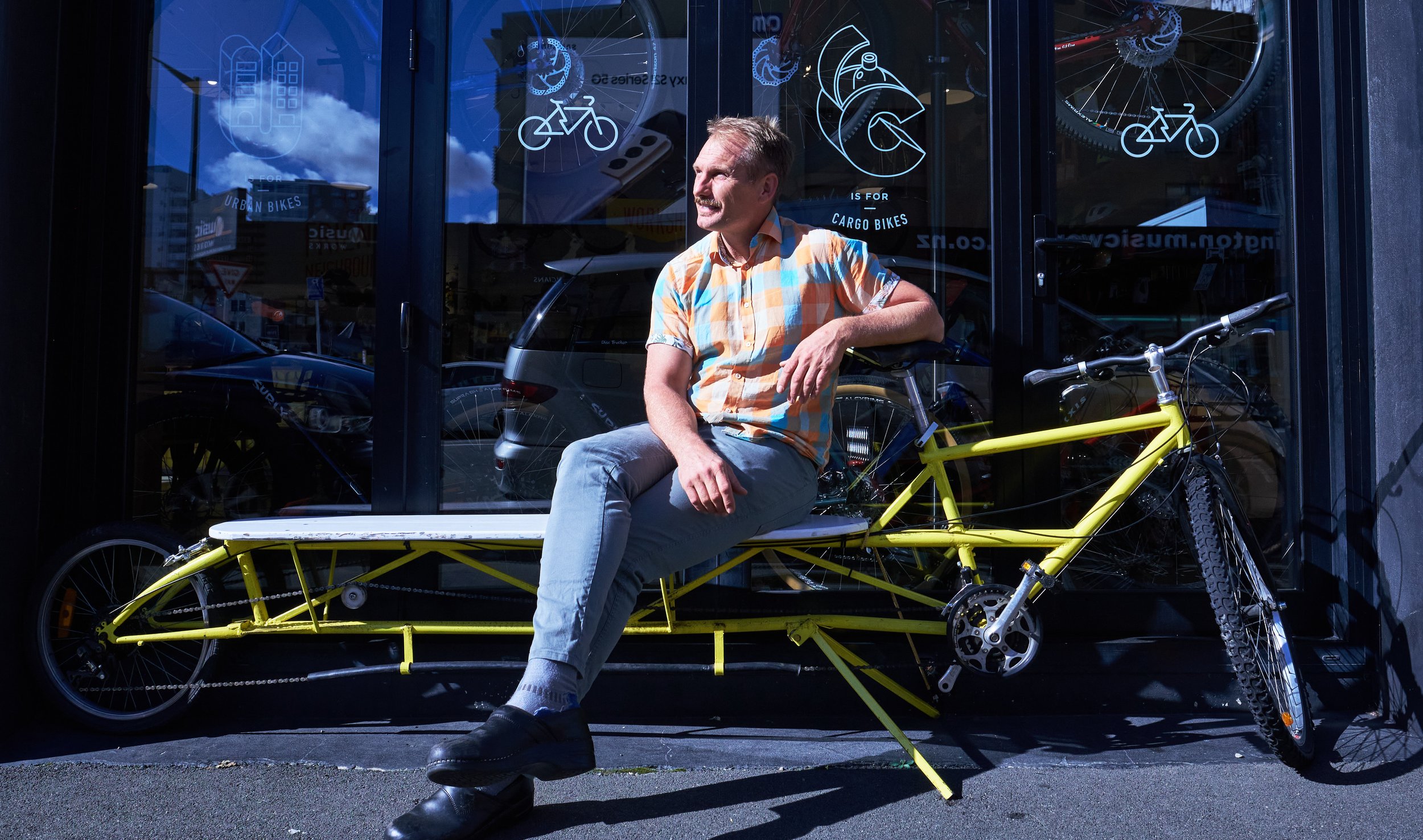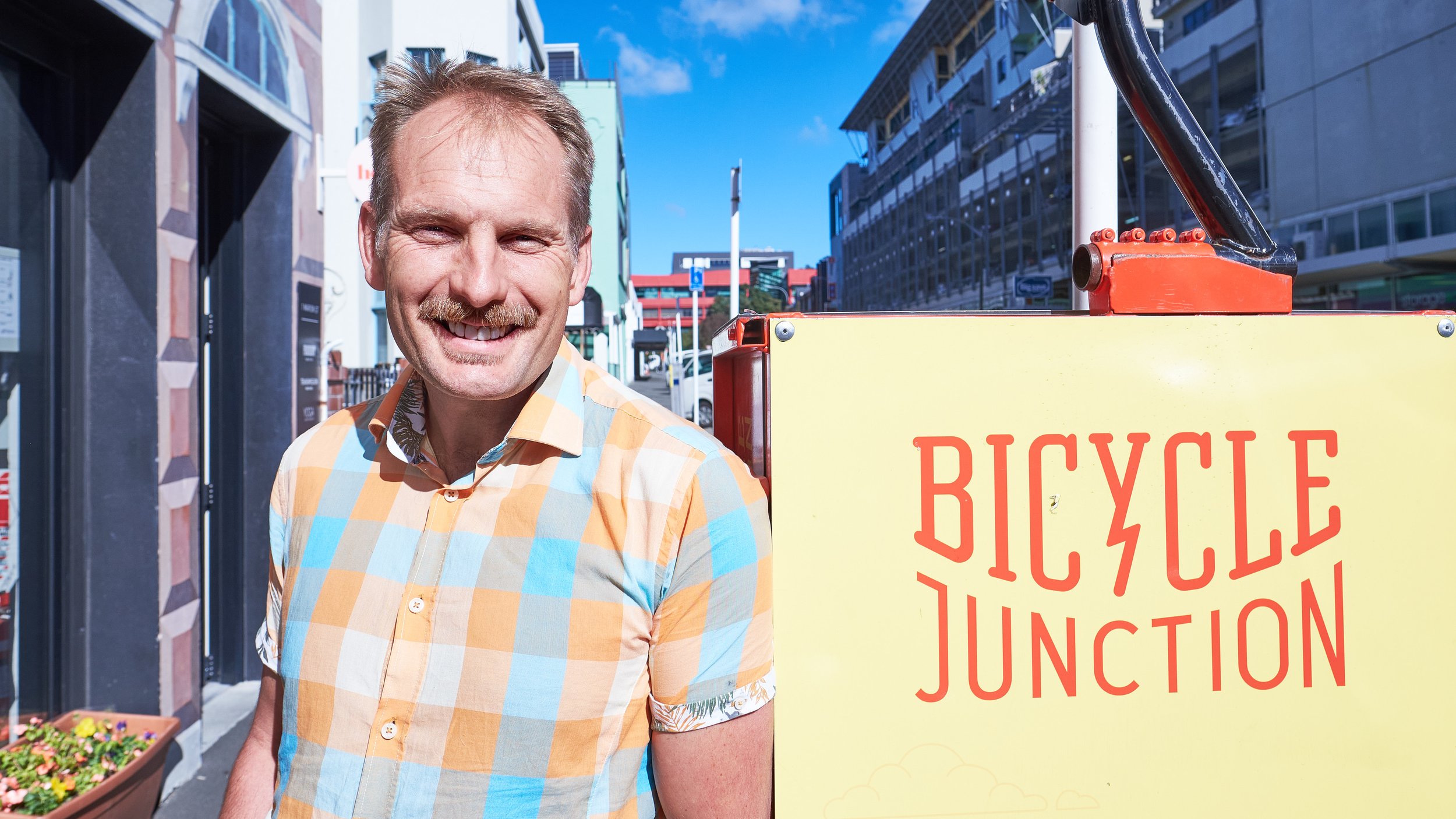Listen to the interview on your favourite podcast app: Apple Podcasts | Stitcher Radio | Spotify | Google
Introducing Dan Mikkelsen, the founder of Bicycle Junction
Dan worked as an apprentice chef in Copenhagen during the late ’90s. It was in this city he discovered a love for messenger biking and the cargo bike.
After returning home and working in the industry as a chef, Dan was faced with a new problem to solve. How to ride his bike and transport his newborn child at the same time.
Dan reached out to Christiania Bikes, a firm in Denmark, to see if he could buy a bike and have it delivered to Wellington, New Zealand. They said, Yes, you can buy a bike, but, you have to buy four! And so, Bicycle Junction was born.
Bicycle Junction is more than just a shop. It’s a community centred around helping people to ride bikes. Dan has combined his enthusiasm for bikes and his experience as a chef to create a bikery.
What’s a bikery? I hear you say. Why it’s a place to hang out with like-minded souls, breathe bike, talk bike, eat and be merry.
What was your vision when you first started your venture?
I've always had a passion for carrying things by bike. I lived in Copenhagen from 1998–2002, working as a bike messenger and loved all the cargo bikes. I had an old original 80-year-old cargo bike frame that I restored. I also owned an old Thai rickshaw. Every time I rode it, people wanted to hire me. It ended up being a small side hustle.
When I started the original business 11 years ago, the vision was ‘how can I buy a cargo bike to carry my firstborn child?’ I would carry him in a sling on my fixie, but it became more uncomfortable as he grew.
I called up the only company I knew in Denmark, Christiania Bikes and asked if they could deliver a cargo bike to New Zealand. They said yes, but, you have to buy four due to the way the bikes were packed for shipping. So, I had to sell three bikes and ended up selling four. That meant I had to order two pallets, leaving me with three more bikes to sell. I set up a website and started selling cargo bikes online.
More people bought the bikes, I ordered more and storage become an issue. As things grew, I rented a garage, then while looking for a small warehouse I found a retail space in Newtown. Three weeks later I had a bike shop!
The vision for the shop is wanting to help more people be engaged in riding bikes. My realisation here was if I wanted to help more people ride bikes, I shouldn’t appeal to those who already ride bikes.
I had always admired businesses that did more than one thing. But all parts need to be integrated and executed well. The idea of a café and bike shop has always appealed to me. I previously worked in the hospitality industry as a chef. And I had been talking about it with my bike shop friends for some time. When the opportunity to take on the retail space came up I thought I had better also sell coffee as I’ve been talking about it for so long. The location was great, right next to Wellington Hospital.
The move wasn’t entirely impulsive. As my vision was to help more people ride bikes. The coffee provided a reason for people to come into the store and be comfortable without feeling that they need to buy a bike. It’s a nice Segway into a conversation about bikes. Not that I was trying to convert every customer into a cyclist. But as they become regulars it builds community.
People can be daunted by sportbike shops. They are full of lycra, fancy glasses and the salesperson speaks a lot of technical jargon. It's not a welcoming space. So we sell bikes to people who don't currently ride or who wouldn’t think of themselves as a cyclist. We talk about cyclists and cycling. Cycling is a sport. A cyclist partakes in the sport of cycling. But, if you ride a bike for transport, you’re just a person who rides a bike to get from A to B. It doesn’t identify you, it's just what you do.
The shop is all about creating a welcoming and comfortable space. A place where people want to linger. I think back to living in Copenhagen. Every morning people head to the bakery. The baker knows them by name and neighbours chat while queueing. That’s the feeling I look to foster with Bicycle Junction. We know our customers by name and our customers know each other. Bicycle Junction has a little community surrounding it.
How did you deal with early setbacks?
I started the business with my last paycheque.
Everything was new to me. Although I knew a lot about bikes, I had never worked in retail or a bike shop before. There were loads that I needed to learn. When there’s a lot of financial backing available, there’s plenty of room to make big mistakes. And I made some mistakes at the start. But they were quite measured by the nature of not having much money.
As you grow, you learn. If you learn on a small scale for what those mistakes are, when you graduate to a bigger scale, you’re less likely to fall into those traps. I’d say I’ve been quite lucky, as there was plenty of opportunities to make big mistakes if I had more financial backing. An open slate can make it hard to be creative without the constraints to problem solve.
Was there a time that you wanted to give up?
Absolutely. There’s been plenty of tough times. When I started the store in Newtown, on that first day, I only had three bikes on the floor. Two of which were my own! The constant growing pains of cash flow has been quite stressful at times.
Particularly after moving the shop into Wellington’s city centre. We were always modest during the Newtown days. Growing well, but keeping it in check. Moving into town was a big leap for us. Especially with a costly shop refit.
Moving a business is similar to starting all over again. We did keep a lot of our Newtown regulars. There were times that I questioned the move.
But, in those dark times, I realise there's only one way out. And that’s forward. There’s a phrase my head chef used when I was an apprentice, “Full speed over thin ice”. You don’t look down, you just know what needs to be done and keep moving. Cheffing prepared me for pressure, stress and long hours.
At home we laugh about buying our first house, having three kids and starting two businesses all at the same time! Sometimes I wonder, “What were we thinking!” Luckily we’re both passionate about our work.
Sometimes I briefly think about giving up. But, it only takes seeing a family out on one of our bikes to remind me of why I started Bicycle Junction in the first place.
Were there any traps that you fell into?
I’m wary that manufacturers are eager for their distributers to buy many bikes, making it easy to over-commit. And bike shops need stock on the floor. As a relatively low margin retail business, I try not to overextend my cash flow. Electric bikes in particular are high cost and low margin.
One trap I haven’t fallen into is playing the price game. There’s no way Bicycle Junction can compete on price alone against nationwide stores. So we don’t.
We have a different style of service. Providing a higher quality of service as a point of difference. We’ve built up a good base of loyal customers. We’re not the cheapest and that's okay. What you pay at our store ensures the bike that you buy is going to last, servicing will be carried out correctly, fair wages for our staff. You’re also supporting events for Wellington’s greater cycling community.
“The Wellington Hustle Interview Project is brought to you by timson.co.
Headshots and Story Brand Photos.
Show off your vibe and attract your tribe with a new set of photos.”
What inspires and motivates you?
Seeing families on their bikes. I feel enormous pride that Bicycle Junction has played a part in growing cargo biking in New Zealand. They are particularly popular in Wellington.
I feel that they are such a good thing for children and families. Of course, there’s the should reasons, such as good for the environment. But generally, cargo bikes are great for having a good time.
My family went without a car completely for a while. We do have a vehicle now, but the kids all much prefer taking the bike. I hear that it’s the same for every cargo bike family. That to me means our kids are growing up favouring a different form of transport and realising that car ownership is just one option.
Our customers tell us that electric bikes, in general, become the easiest way to get around. Even in the rain, people will jump on their electric bike instead of taking the car. That’s because it’s still easier than finding a car park.
Can you describe a breakthrough that you're particularly proud of?
People in Wellington now know what a cargo bike is. Children can now point them out to their parents.
The first few days after getting our new bike, a photo was taken of us, with our kids in the front, and posted to a website called weird in Wellington. There were comments made such as, “is it a wheelbarrow?”, “Did you make it from a shopping trolly?”. People just really had no idea what it was.
It’s gratifying that there’s public knowledge about them now. That's a particularly important breakthrough. It means they have entered the mainstream consciousness. And cargo bikes are not just a novelty for an eccentric family. They’re not just for mad cyclists and eco-warriors. Cargo bikes are a real and attractive transport option for the regular family.
What do you see as being your biggest lesson?
Running Bicycle Junction is different from being a chef. I was always working to immovable deadlines. In a restaurant, you can’t go out to a table and say “Sorry your dinner is going to be a few more hours and it will cost an extra $50.” That’s how tradesmen work 😉. You just need to learn how to make those immovable deadlines work. And when you get to the deadline, you’re done. You savour the moment, feel the afterglow and prepare to start all over again.
Working on Bicycle Junction, there is never an end. Yes, there can be some projects that start and finish. But generally, I’m not accustomed to the constant nature of being a business owner. I’ve found the lack of completion, relax and back to work cycle quite difficult. And having three kids at home means you can’t finish work and zone out. There’s always something to do.
I’ve just had to acknowledge that I can't work eighteen hours a day for nine years straight.
Fortunately, the business is at a point where I've eased up on my hours. Two years ago I would work seven days a week. Now I'm working five. Life is more enjoyable, I’ve built up the business and its crew.
I still love project work, those immovable deadlines and the feeling of completing something in full. But, I’m also still learning how to manage my energy levels. I'm quite impulsive/compulsive. If I'm going to do something, I'm going to do it entirely. Mediocrity irks me. Especially doing a task that's just good enough. ‘Done is better than perfect' still is difficult for me.
Has your vision always been clear and how has it evolved?
Bicycle Junction is essentially the same business. We still use the same mission statement that boils down to ‘helping more people enjoy riding bikes’.
I was aware that moving locations could change our vibe. Although we refreshed the look and feel, we did retain our welcoming feeling and community.
We still focus on cargo bikes. These are mainly electric now, reinforcing the idea of transport cycling. We have more staff, sell and repair more bikes, and we still have the cafe. It hasn’t changed a lot and I’m happy about that. It shows us that from the start our idea was right and needed. We're not trying to expand, but rather focus on doing what we do well.
What would you do differently if you had to start again from scratch?
I started Bicycle Junction coming from fifteen years of working seventy hour weeks as a chef, working on big projects around the country. I was exhausted. Then I become a new father and started my first business. At times I’ve struggled with my energy. I really should have taken a year off. Now I would make sure I was well-rested.
Now that my children are older, I get a lot more sleep. That’s made a huge difference to my energy levels.
CONNECT WITH Dan
If you have enjoyed this article and want to start a conversation with Dan, you can reach out on:
Website: bicyclejunction.co.nz
Instagram: @bicyclejunctionnz
Youtube: Bicycle Junction
Facebook: @bicyclejunction
Please don’t forget to tell Dan that I sent you.
MORE WELLINGTON HUSTLE INTERVIEWS?
Why not check out some of my other amazing interview guests…
Interview and photography by Wellington Headshots Photographer Tim Morrison (all rights reserved)











